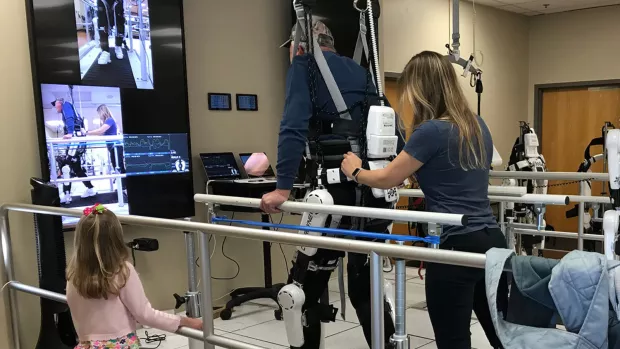
MS brain health – what is it, and how do we protect it?
Today is World Brain Day, and this year’s theme is Brain Health and Disability. Professor Gavin Giovannoni heads up the ‘MS Brain Health’ initiative. He’s raising awareness of the importance of brain health to help create a better future for people with MS and their families.
We know getting older affects the brain. From our mid-thirties, we all gradually lose nerves, with the consequence that our brains shrink and their functioning gets worse.
What protects us from the effects of this ageing is something called ‘reserve’ or ‘resilience’. Brains are very flexible. If one area gets damaged, other areas can work harder to compensate. How well our brains do this relies on:
- The size of our brain (our neurological reserve)
- Our education and ability to learn (our cognitive reserve)
So brain health is about what we do to maximise this reserve so we have the necessary resilience to deal with ageing as we get older.
Why is brain health important in MS?
This ability to compensate for damage, explains why people might have MS for some time before noticing certain symptoms and worsening function.
MS can reduce both types of reserve. As a result, people with MS can experience the impact of ageing earlier. This is not unique to MS and occurs with many other brain diseases, for example, traumatic brain injury.
I suspect this is a large part of what’s happening when people feel their MS is getting worse, despite not having evident inflammatory activity (for example, relapses or new lesions on MRI).
What can I do for my brain health?
We know from studies in people without health conditions there are things that we can do to maximise reserve. This means we don’t only treat MS-specific issues but also focus on other factors affecting brain health. We need to look at MS holistically.
Early diagnosis and treatment
We know waiting a long time to be diagnosed and then a further period of time to be started on a treatment comes at a cost. I think it’s quite clear that the more effective therapies help slow down nerve loss. So if you have active MS, make sure you get onto a disease-modifying therapy (DMT) that keeps your MS inactive.
Lifestyle
There are many really important aspects of brain health that aren’t linked specifically to MS, but to lifestyle that can help:
- Exercising
- Having a healthy diet
- Not drinking too much alcohol
- Sleeping well
- Stopping smoking
- Keeping your mind active
- Staying socially connected
- Other health conditions, like depression, anxiety, recurrent infections, diabetes, high cholesterol, or hypertension should be prevented or diagnosed promptly and adequately controlled
Some of these, like the positive effects of quitting smoking and exercise, have good evidence in MS.
Others we know about from studies in the general population, but need better evidence in MS. For example, diets that focus on restricting calories and fasting.
Lifestyle factors are hard to study, so I believe, for now, at least, we have to take the evidence we can get at face value. I have little doubt that the maxim ‘what is good for the heart is good for the brain’ is correct.
"Lifestyle factors are hard to study, so I believe, for now, at least, we have to take the evidence we can get at face value. I have little doubt that the maxim ‘what is good for the heart is good for the brain’ is correct."
Research into treatments
As we better understand the biological mechanisms that cause ageing, we may be able to develop treatments that target it. For example, the diabetes drug metformin has been shown to help cells involved in myelin repair behave like young cells in rats. I envisage in the future using anti-ageing drugs as add-on therapies to treat MS.
What difference can a brain-healthy lifestyle make?
We need to remember ageing is a normal process. We can’t stop it, but I think a brain-healthy lifestyle could significantly contribute to improving MS outcomes.
For example, one study showed that people with MS who also had health conditions affecting their blood vessels (vascular disease) started using a walking stick six years earlier. That’s bigger than the effect of the early injectable DMTs (interferon-beta and glatiramer acetate) on slowing down the acquisition of disability.
Read more about this study on the journal website
If we break down everything we can think of that goes into improving brain health and improve each one even by just 1%, we’d get a big overall improvement when they’re all put together. This is known as the ‘principle of marginal gains’ and is based on the approach of Sir David Brailsford the very successful British Cycling coach.
What’s next for MS brain health?
Our first policy report has already changed the way MS is managed, and we’re now working on an update to the report to include more recent evidence. The MS Society is one of the organisations that’ll be supporting this work.
Read the original report and suggest topics for the new report on the MS Brain Health website
Read more about brain health in Gavin’s MS-Selfie newsletter and website



